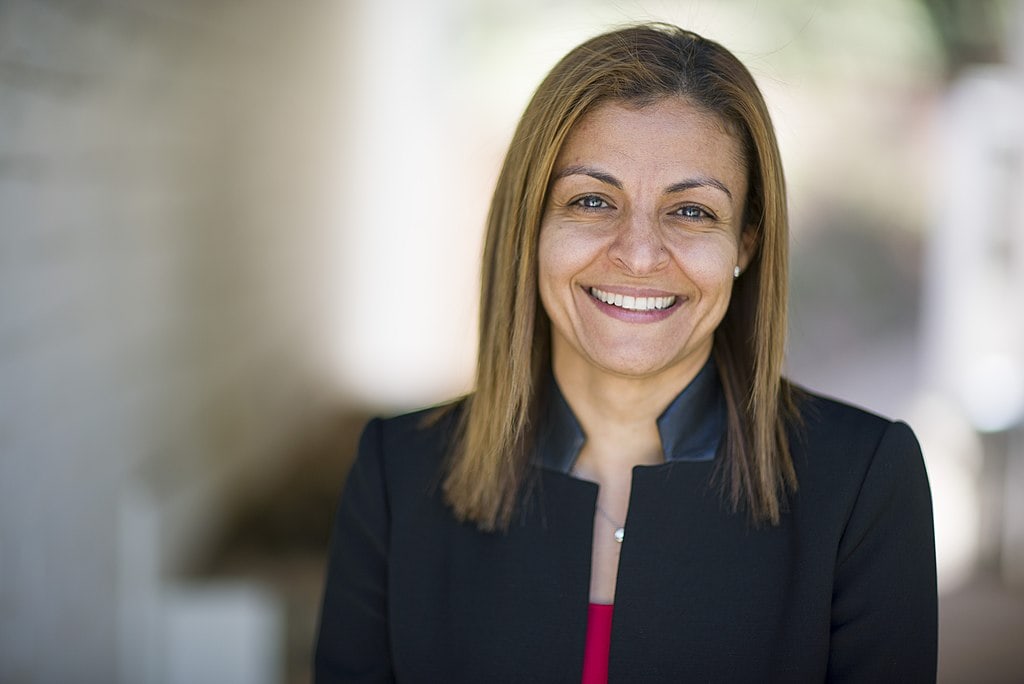Maryana Iskander, CEO of South Africa’s Harambee Youth Employment Accelerator Photo by: Gabriel Diamond CC BY-SA 4.0
I am so excited to share a story about the occasionally small world of social entrepreneurship!
Two years ago, at the last in-person Skoll World Forum, we celebrated the 2019 winners of the Skoll Award for Social Entrepreneurship. One of the best things about attending the Forum is getting to meet the new Awardees, because they are pretty much all doing mind-blowing work. At the conference, I was chatting with Maryana Iskander, the CEO of South Africa’s Harambee Youth Employment Accelerator, about the challenges of getting global attention for great work done by organizations not based in countries like the U.S. During the conversation, Maryana observed that she didn’t have a Wikipedia entry, but that she assumed I did, even though we had both won the Skoll Award. She didn’t have to state the obvious, which was that it was far more likely for a white American male (yep, that’s me) to get that kind of recognition than a woman of color based in Africa.
Luckily, being the nerd that I totally am, my immediate response was “I can fix that!” Now, I am nothing compared to the power editors who volunteer so many hours and make tens of thousands of Wikipedia edits, but I knew how to create an article.
Digging into Maryana’s implied challenge, I learned that Wikipedia has had a bit of a diversity challenge over the years (understatement alert). As part of my research, I learned a few things:
- Female Skoll Award winners were less likely to have a Wikipedia page than male award winners.
- If they were based outside the United States, even less likely.
Next, I learned about a group of dedicated Wikipedians working on the larger problem of women leaders not being recognized with articles, even if just as (or more) notable than their male peers. The project is called Women in Red, and the name comes from their mission to turn mentions of women leaders in Wikipedia that are highlighted in red (which means no article exists) to their name being highlighted in blue (which links to the Wikipedia article about that person).
I contacted my (adult) son Jimmy, who was enthusiastic about pitching in with me on a volunteer project to identify noteworthy social entrepreneurs who lacked articles as part of Women in Red (hint, more need attention!). The very first article we wrote was on Maryana Iskander (Jimmy doing most of the work), and Jimmy also created an article on Harambee as a Skoll-winning organization, before going on to adding more female social entrepreneurs. Now, this process isn’t an easy one, and we ran into the typical headwinds for adding new Wikipedia articles. I remember a conversation with an editor who asked me, in effect, how a woman leader from Pakistan could be notable enough for Wikipedia. She was and is notable enough, and Skoll Award winner Quratulain Bakhteari is no longer a Woman in Red because her article is still there. Women in Red volunteers helped us navigate this process to both get these articles to stick, as well as ensure that the articles were up to Wikipedia quality standards.
So, why am I telling you this story?
This week, Wikimedia Foundation (the nonprofit that operates Wikipedia) announced a new CEO.
Her name is Maryana Iskander!
And, in her first interview with the Washington Post, she zeroed immediately in on Wikipedia’s diversity challenge. I am so looking forward to seeing her lead Wikimedia into the future, and doing whatever I can to support her in this crucially important work. Wikimedia Foundation is one of the crown jewels of the tech for good movement, but I’m certain Maryana will help it be even better and stronger in bringing reliable knowledge to the world!
Jim






0 Comments